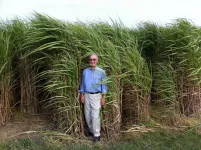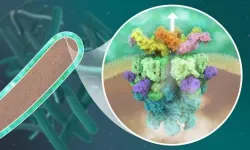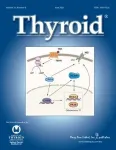(Press-News.org) More corn is grown in the United States than any other crop, but we only use a small part of the plant for food and fuel production; once people have harvested the kernels, the inedible leaves, stalks and cobs are left over. If this plant matter, called corn stover, could be efficiently fermented into ethanol the way corn kernels are, stover could be a large-scale, renewable source of fuel.
"Stover is produced in huge amounts, on the scale of petroleum," said Whitehead Institute Member and Massachusetts Institute of Technology (MIT) biology professor Gerald Fink. "But there are enormous technical challenges to using them cheaply to create biofuels and other important chemicals."
And so, year after year, most of the woody corn material is left in the fields to rot.
Now, a new study from Fink and MIT chemical engineering professor Gregory Stephanopolous led by MIT postdoctoral researcher Felix Lam offers a way to more efficiently harness this underutilized fuel source. By changing the growth medium conditions surrounding the common yeast model, baker's yeast Saccharomyces cerevisiae, and adding a gene for a toxin-busting enzyme, they were able to use the yeast to create ethanol and plastics from the woody corn material at near the same efficiency as typical ethanol sources such as corn kernels.
Sugarcoating the issue
For years, the biofuels industry has relied on microorganisms such as yeast to convert the sugars glucose, fructose and sucrose in corn kernels to ethanol, which is then mixed in with traditional gasoline to fuel our cars.
Corn stover and other similar materials are full of sugars as well, in the form of a molecule called cellulose. While these sugars can be converted to biofuels too, it's more difficult since the plants hold onto them tightly, binding the cellulose molecules together in chains and wrapping them in fibrous molecules called lignins. Breaking down these tough casings and disassembling the sugar chains results in a chemical mixture that is challenging for traditional fermentation microorganisms to digest.
To help the organisms along, workers in ethanol production plants pretreat high-cellulose material with an acidic solution to break down these complex molecules so yeast can ferment them. A side effect of this treatment, however, is the production of molecules called aldehydes, which are toxic to yeast. Researchers have explored different ways to reduce the toxicity of the aldehydes in the past, but solutions were limited considering that the whole process needs to cost close to nothing. "This is to make ethanol, which is literally something that we burn," Lam said. "It has to be dirt cheap."
Faced with this economic and scientific problem, industries have cut back on creating ethanol from cellulose-rich materials. "These toxins are one of the biggest limitations to producing biofuels at a low cost." said Gregory Stephanopoulos, who is the Willard Henry Dow Professor of Chemical Engineering at MIT.
Lending yeast a helping hand
To tackle the toxin problem, the researchers decided to focus on the aldehydes produced when acid is added to break down tough molecules. "We don't know the exact mechanism by which aldehydes attack microbes, so then the question was, if we don't really know what it attacks, how do we solve the problem?" Lam said. "So we decided to chemically convert these aldehydes into alcohol forms."
The team began looking for genes that specialized in converting aldehydes to alcohols, and landed on a gene called GRE2. They optimized the gene to make it more efficient through a process called directed evolution, and then introduced it into the yeast typically used for ethanol fermentation, Saccharomyces cerevisiae. When the yeast cells with the evolved GRE2 gene encountered aldehydes, they were able to convert them into alcohols by tacking on extra hydrogen atoms.
The resultant high levels of ethanol and other alcohols produced from the cellulose might have posed a problem in the past, but at this point Lam's past research came into play. In a 2015 paper from Lam, Stephanopoulos and Fink, the researchers developed a system to make yeast more tolerant to a wide range of alcohols, in order to produce greater volumes of the fuel from less yeast. That system involved measuring and adjusting the pH and potassium levels in the yeast's growth media, which chemically stabilized the cell membrane.
By combining this method with their newly modified yeast, "we essentially channeled the aldehyde problem into the alcohol problem, which we had worked on before," Lam said. "We changed and detoxified the aldehydes into a form that we knew how to handle."
When they tested the system, the researchers were able to efficiently make ethanol and even plastic precursors from corn stover, miscanthus and other types of plant matter. "We were able to produce a high volume of ethanol per unit of material using our system," Fink said. "That shows that there's great potential for this to be a cost-effective solution to the chemical and economic issues that arise when creating fuel from cellulose-rich plant materials."
Scaling up
Alternative fuel sources often face challenges when it comes to implementing them on a nationwide scale; electric cars, for example, require a nationwide charging infrastructure in order to be a feasible alternative to gas vehicles.
An essential feature of the researchers' new system is the fact that the infrastructure is already in place; ethanol and other liquid biofuels are compatible with existing gasoline vehicles so require little to no change in the automotive fleet or consumer fueling habits. "Right now [the US produces around] 15 billion gallons of ethanol per year, so it's on a massive scale," he said. "That means there are billions of dollars and many decades worth of infrastructure. If you can plug into that, you can get to market much faster."
And corn stover is just one of many sources of high-cellulose material. Other plants, such as wheat straw and miscanthus, also known as silvergrass, can be grown extremely cheaply. "Right now the main source of cellulose in this country is corn stover," Lam said. "But if there's demand for cellulose because you can now make all these petroleum-based chemicals in a sustainable fashion, then hopefully farmers will start planting miscanthus, and all these super dense straws."
In the future, the researchers hope to investigate the potential of modifying yeasts with these anti-toxin genes to create diverse types of biofuels such as diesel that can be used in typical fuel-combusting engines. "If we can [use this system for other fuel types], I think that would go a huge way toward addressing sectors such as ships and heavy machinery that continue to pollute because they have no other electric or non-emitting solution," Lam said.
INFORMATION:
DURHAM, N.C. - Biomedical engineers at Duke University have demonstrated a tablet-sized device that can reliably detect multiple COVID-19 antibodies and biomarkers simultaneously.
Initial results show the test can distinguish between antibodies produced in response to SARS-CoV-2 and four other coronaviruses with 100% accuracy.
The researchers are now working to see if the easy-to-use, energy-independent, point-of-care device can be used to predict the severity of a COVID-19 infection or a person's immunity against variants of the virus.
Having also recently shown the same "D4 assay" platform can detect Ebola infections a day earlier than the gold standard polymerase chain reaction (PCR) test, the researchers say the results show how flexible the technology can be to adapt to other ...
CAMBRIDGE, MA - Boosting production of biofuels such as ethanol could be an important step toward reducing global consumption of fossil fuels. However, ethanol production is limited in large part by its reliance on corn, which isn't grown in large enough quantities to make up a significant portion of U.S. fuel needs.
To try to expand biofuels' potential impact, a team of MIT engineers has now found a way to expand the use of a wider range of nonfood feedstocks to produce such fuels. At the moment, feedstocks such as straw and woody plants are difficult to use for biofuel production because they first need to be broken down to fermentable sugars, a process that releases numerous byproducts that are toxic to yeast, the microbes most commonly used to produce biofuels.
The ...
Tuberculosis is one of the top ten causes of death worldwide, infecting about one-quarter of the world's population. Although it is treatable, the rise of multidrug-resistant tuberculosis poses a major threat to global health security, and has been declared by the World Health Organization as a global health emergency. Reduced access to diagnosis and treatment during the COVID-19 pandemic is expected to dramatically increase the number of tuberculosis infections. This will set global efforts to tackle the disease back several years.
Tuberculosis is caused by infection with Mycobacterium tuberculosis: a bacterium that infects human lungs and other organs by using complex molecular ...
When Winter Storm Uri hit, many Texans lost power from February 14-20, resulting in losses of lives and economic activity, and damages to their homes that for some are still not completely repaired. Now, four months later as demand for electricity has increased at the start of the summer amid tight supply, Texans continue to prioritize improvements to the power grid, albeit with doubt as to whether the Texas Legislature and Governor can get the job done.
In a survey by the Hobby School of Public Affairs and UH Energy at the University of Houston fielded between May 13-24, 1,500 individuals in Texas aged 18 and older responded to a series of questions regarding their experience during Winter Storm Uri and their evaluation ...
BOSTON - At the recent 2021 Annual Scientific Sessions of the American Diabetes Association, researchers from Massachusetts General Hospital (MGH) presented positive updates on their trials of the bacillus Calmette-Guérin (BCG) vaccine to safely and significantly lower blood sugars.
In type 1 diabetes, an autoimmune disease which currently has no cure, T cells attack the pancreas and destroy its ability to create insulin, a hormone vital in allowing glucose to enter cells to produce energy. In prior work, Denise Faustman, MD, PhD, director ...
A new study by UC Davis researchers confirms the low likelihood that SARS-CoV-2 contamination on hospital surfaces is infectious. END ...
Scientists from the University of Michigan have developed an innovative way to use NASA satellite data to track the movement of tiny pieces of plastic in the ocean.
Microplastics form when plastic trash in the ocean breaks down from the sun's rays and the motion of ocean waves. These small flecks of plastic are harmful to marine organisms and ecosystems. Microplastics can be carried hundreds or thousands of miles away from the source by ocean currents, making it difficult to track and remove them. Currently, the main source of information about the location ...
New Rochelle, NY, June 24, 2021—The American Thyroid Association, the European Association of Nuclear Medicine, the European Thyroid Association, and the Society of Nuclear Medicine and Molecular Imaging released a joint statement on three key topics addressing controversies in thyroid cancer care. The joint statement is published in the peer-reviewed journal Thyroid®, the official journal of the American Thyroid Association® (ATA®).Click here to read the statement now.
An inter-societal working group addressed the current controversies and evolving concepts in three main areas: peri-operative risk stratification; the role of diagnostic radioactive iodine ...
Toronto, ON - Despite research showing associations between anabolic steroid use and criminal offending, the possibility of a similar association between legal performance-enhancing substance use, such as creatine, and criminal offending remained unknown. A new study published online in the journal Drug and Alcohol Dependence now shows that both forms of performance-enhancing substance use is longitudinally associated with criminal offending among U.S. adults.
The study, which analyzed a sample of over 9,000 U.S. participants from the National Longitudinal Study ...
Liza Makowski, PhD, professor in the Department of Medicine and the UTHSC Center for Cancer Research, has long been interested in how the immune system is altered by obesity and how this impacts cancer risk and treatment.
"Obesity is complex, because it can cause both inflammation and activate counter-inflammation pathways leading to immunosuppression," Dr. Makowski said. "How obesity impacts cancer treatments is understudied."
Obese patients with breast cancer often have worse outcomes than non-obese patients. However, exciting developments are being made in other cancers that may also hold promise for treating breast cancer. In studies of ...





